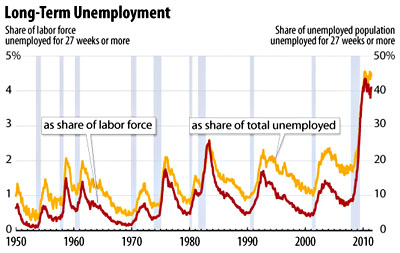The New York Times reports that employers don’t want to hire people who have been out of work for a long time:
A recent review of job vacancy postings on popular sites like Monster.com, CareerBuilder and Craigslist revealed hundreds that said employers would consider (or at least “strongly prefer”) only people currently employed or just recently laid off….Given that the average duration of unemployment today is nine months — a record high — limiting a search to the “recently employed,” much less the currently employed, disqualifies millions.
The positions advertised with preferences for the already-employed run the gamut. Some are for small businesses, and others for giants, including the commercial University of Phoenix (which, like some other companies, removed the ads after an inquiry by The New York Times) or the fast-food chain Pollo Tropical. They cover jobs at all skill levels, including hotel concierges, restaurant managers, teachers, I.T. specialists, business analysts, sales directors, account executives, orthopedics device salesmen, auditors and air-conditioning technicians.
For what it’s worth, this has always been true. Having a long gap in your resume has always been a problem, and having a long current gap has always been a really big problem unless there’s a mighty convincing explanation for it. The difference  today isn’t that employers have changed, it’s that they’re so swamped with job applications that they figure they might as well just admit their biases up front.
today isn’t that employers have changed, it’s that they’re so swamped with job applications that they figure they might as well just admit their biases up front.
The other difference, of course, is that there are more long-term unemployed than there used to be — far more than in any previous recession. In the past, someone out of work for a year might very well have been someone pretty unmotivated to find a job, and therefore not especially desirable. Today it’s far more likely that they’re still extremely motivated but there are just no jobs to be had. So ironically, the very recession that’s caused a long-term spell of joblessness to be less meaningful in fact has caused it to be more meaningful in practice. It’s a way in which cyclical unemployment can turn into structural unemployment, and it’s yet another reason we should be using every possible trick in both our fiscal and monetary bags to fight cyclical unemployment and get it under control. Luckily, Congress is focused like a laser beam on getting the economy moving and bringing down the unemployment rate, so this shouldn’t be a problem for too much longer.
Oh wait.















